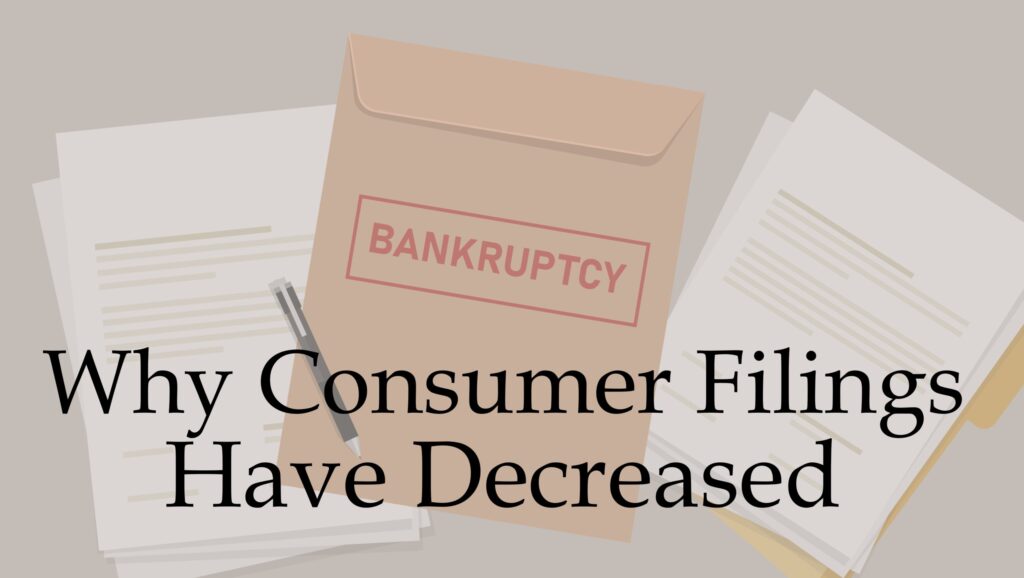Decrease in Bankruptcy Filings
In the five months since “Covid” and the “Coronavirus” have become household words, the American economy experienced more turbulence than at any time since the Great Recession. Business bankruptcies for small, medium, and even multinational corporations have spiked considerably since March 2020. Many of these businesses, especially in the retail industry, may never bounce back.
However, consumer filings have decreased between 15% – 30% compared to the same period of time in 2019. With unemployment numbers reaching historic highs, why have consumer bankruptcy filings decreased?
There are several different reasons why consumer bankruptcy filings have decreased. Setting aside the politics that were involved, the main reason that consumers have not sought bankruptcy protection is the Stimulus Plan. This Plan provided immediate payments to working Americans and a federal supplement to unemployment insurance, helping many working families manage their finances while their employers were shut down, or operating at reduced hours/manpower. Some working Americans fared better under the new unemployment guidelines than if they were still employed. While the Stimulus Plan also included measures to assist businesses, much of that financial relief was insufficient, especially for businesses that were already operating on a thin margin prior to the Covid pandemic.
Understanding the common reasons for bankruptcy filings will help explain the recent decrease in consumer bankruptcy filings. Unfortunately, this will also provide a bleak forecast for American consumers for the remainder of 2020.
Foreclosure
Many banks and lending companies that had financed residential home purchases immediately offered payment moratoriums to their borrowers. During the moratorium, the borrowers were not required to make their mortgage payments. Some of these moratoriums lasted for three months, while some extended to six months. These moratoriums were extended to borrowers affected by Covid. However, they also benefited borrowers who are already in default on their mortgage payments. Because of the decrease in foreclosures due to the moratoriums, as well as subsequent loan modifications, many borrowers who would have sought bankruptcy court assistance to protect their homes did not need to do so.
Evictions
While mortgage moratoriums were undertaken without government intervention, many residential evictions were enjoined by acts of the federal or state governments. However, the moratoriums on these evictions will be ending soon. When this happens, many landlords will seek to evict their present tenants and replace them with paying tenants.
Lawsuits
The closure of many public offices, such as the courts, prevented many creditors from filing lawsuits. Additionally, many of the law firms who handle debt collection cases were operating remotely, or with reduced staff. This hindered their ability to file cases.
Now that the courts are starting to open on a limited basis, more debt collection lawsuits can be expected. Additionally, this pandemic has moved many law firms towards electronic case filing, which will allow them to file cases without physically visiting the courthouse.
Garnishments
Judgment creditors have the ability to garnish a debtor’s wages as a method of collecting on the judgment. However, consumers who lost their jobs and were receiving unemployment income could not be garnished. Unemployment income is exempt under Georgia law. It cannot be seized and applied to a civil judgment.
A Bleak Forecast for Consumers
Why the bleak forecast for consumers? Whether due to Covid, government reaction to Covid, or lender reaction to Covid, many consumers avoided the type of financial distress that would make bankruptcy an option. But this is going to change soon:
- The mortgage moratoriums are ending or will end soon, and borrowers will be confronted with having to catch up their past due mortgage payments at once, or find some other option (such as a loan modification) to address their home payment default.
- Renters will also have to address a similar issue as the eviction moratoriums.
- With courts reopening and law firms operating at a fairly normal capacity, debt collection lawsuits will approach, if not exceed, their pre—Covid volume.
- Finally, as workers return to work, they will be receiving wage income which can be garnished by a judgment creditor.
Even if a vaccine is discovered and distributed, the economic damage which Covid caused will still be borne for months, if not years.
Planning for Your Future
Although there have been a decrease in bankruptcy filings, consumers just like you can still get relief. If your finances have been adversely affected by the pandemic and you have questions about bankruptcy, contact us today. You can schedule a free, no obligation consultation with one of our attorneys who will help determine if bankruptcy might be right for you.

